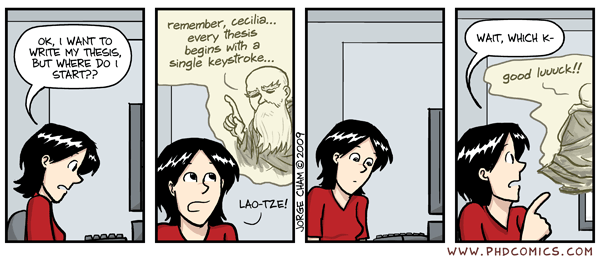Academia is full of horror stories and advice. But this is awesome. This is James Paul Gee’s “Ramblings of an old academic: Unconfident advice for end-times academics”. It’s very much worth reading the whole thing but if you don’t then at least check out his advice:
So I have no real advice that you should take without a massive grain of salt. But here it is any way:
1. Your job as an academic is to have ideas and to put them together with other people’s ideas to make better ones with potential for real impact. This mission precedes thoughts of gain, publication, or fame.
2. Keep one foot in your college or university activities and one foot outside in a related but different activities that create fruitful and sometimes unexpected synergies.
3. Do not worry over much about protecting your ideas. Let them out in the world early and often so they can get tested and promiscuously mate with other people’s ideas. If someone steals one of your ideas and you were only going to have one good one anyway, then you would not have had a good career anyway—you have to have good ideas over the long haul.
4. Try to develop “taste”, that is, good judgment about which ideas, yours or other people’s, are tasty, deep, and have “legs” for impact into the future, even if at first they seem like weak fledglings. Champion tasty ideas even if others are skeptical and even if they are not your ideas.
5. Pick your political battles carefully. Academic politics and committees damage our minds, bodies, and souls. Pick only the battles really worth fighting for and fight them and them alone. How do you know which these are? They are the ones that when you really think about it are worth taking real risks of damage to yourself and your career for. They are the ones where winning means making the world a better place.
6. Good ideas often come from unexpected experiences, ones we are tempted not to follow up on because they might lead us away from our “field”. Every book I have written was caused by following up a lead that at first seemed marginal and strange from the perspective of how I or others construed my “field”. One example: I wrote a book on video games because my then six-year-old turned me onto them. While I was writing the book in 2001-2002 the whole idea seemed silly if I thought about it too much. I had Walter Mitty dreams of getting invited to the prestigious Game Developers Conference and creating a whole new field. None of this was likely to happen given that I was totally and utterly unknown in the world of games and given, too, at that time, no one much saw video games as relevant to literacy studies and vice-versa. But both things did happen.
7. The “game” of life is nine innings, to use another sports metaphor. Never give up if you are behind. Play out all the innings and quit only when the fat lady sings. (Sorry again for, continuing the sports metaphor that might now be seen as insensitive to over-weight people.)
8. In my life I have never worried that I was paid less or was less well known than other people. I have only asked myself if I am happy with what I have and acted to get more if and only if I wasn’t, not because other people had more. This has worked well, at least for me. I now know, having worked in education, that it is called a “mastery orientation” (competing with yourself and judging yourself by your own efforts and progress) and not an “achievement orientation” (competing to beat others and judging yourself by how you stand in relationship to others).
9. In my life, I have never cared whether I got the expected rewards others did at the same time as them or before them. I have always been a slow developer and arrived to each party, or stage of development a bit later than others. It seems only to have meant I got to savor some of the benefits later when others were already leaving the party.
10. The world is a mess. We need to at least put a finger in the collapsing dike until someone else can come up with a big idea to replace the whole thing. People will ask you how being an academic allowed you to do any real good in the world. Be sure that at the least your finger is in the dike and then tell them that’s the good you did. That is all I was and am able to do. I have just tried to put my finger in the dike. As I get older I have the fantasy that what will replace the breaking dike and stem the flood is just a wall of people side by side with their fingers in the wall. Standing there, all together, getting wet, but holding the flood at bay, they will come to realize that it is not true that individuals cannot do anything in the face of big challenges. They can put a finger in the dike and yell for others to join them. They may well come to realize then that that wall of fingers in the dike is the big idea we were all waiting for. An idea no one had but everyone contributed to. An odd picture, but the one I end with.
Ramblings of an old academic: Unconfident advice for end-times academics (PDF Download Available). Available from: https://www.researchgate.net/publication/297675768_Ramblings_of_an_old_academic_Unconfident_advice_for_end-times_academics.
